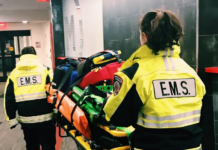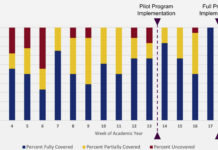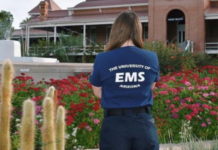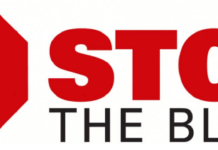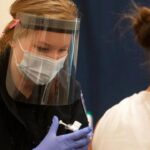Predicting Patient Volumes at Collegiate Football Games
Renko et al. create a model to predict patient volumes at collegiate football games to help aid EMS in planning.
Non-Veterinary Emergency Care of Law Enforcement Canines at Mass Gathering Events
This case report describes the development, implementation, and evaluation of a pilot training course for collegiate EMS providers on the treatment of law enforcement canines.
Assessment of Bystander Intervention on EMS Transport Decisions for Cases of Alcohol Intoxication at...
Looking at a small liberal arts college in New York State, Di Nucci et al. study the impact of bystander intervention on EMS transport decisions for alcohol intoxication cases.
Establishing a Collegiate Emergency Medical Service
Ferdowsian et al. share their experience establishing a new EMS team at the Claremont Colleges.
Embry Riddle Aeronautical University Emergency Response Team hosts a multi-agency active shooter drill based...
Connor Black, the Assistant Chief of the Emergency Response Team (ERT) at Embry-Riddle Aeronautical University, sat down with the JCEMS news team to discuss...
Evaluating the Content and Quality of Emergency Medical Services Oral Patient Handoff Reports
There exists no universal criterion for the patient data to be presented from EMS to hospital Emergency Department (ED) personnel. This study seeks to ascertain what patient data is orally reported by EMS to ED personnel.
Creating a Protocol for Campus EMS Response to Mental Health Complaints
The authors share their experience with developing a mental health response framework for their collegiate EMS service.
Development of an Excel-Based Software Solution to Collegiate EMS Shift Scheduling & Placement
The University of Pennsylvania Medical Emergency Response Team created a Microsoft Excel-based software system to schedule providers for shift coverage.
Comparing Patient Evaluations by a Municipal and a Collegiate-Based Emergency Medical Service
This study assesses UAEMS’ patient evaluations when referenced to Tucson Fire, the local municipal agency.
Implementing Stop the Bleed at Skidmore College
Skidmore College Emergency Medical Services (SCEMS) implemented a Stop to Bleed campaign at Skidmore College. SCEMS organized 20 free bleeding control trainings to train over 60 community members and incorporated $5,000 into the Skidmore Campus Safety 2018 budget for bleeding control equipment.






